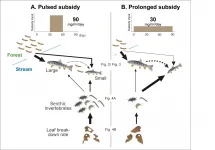(Press-News.org) Less than one-third of COVID-19 clinical trials are led by women, which is half the proportion observed in non-COVID-19 trials, according to research led by Queen Mary University of London, University of St Andrews, Brigham and Women's Hospital and Harvard Medical School.
The study suggests that gender disparities during the pandemic may signify not only a lack of women's leadership in international clinical trials and new research projects, but also may expose the imbalances in women's access to research activities and funding during health emergencies.
The results of the study are being publicised to mark International Women's Day on Monday 8 March. This year's theme is 'Choose To Challenge' which aims to encourage people to challenge and call out gender bias and inequality.
The research team searched a database of all COVID-19 clinical trials from 1 January 2020 to 26 June 2020 and recorded the gender of the principal investigator of each clinical trial, where that data were available (1,548 clinical trials). They then looked at the same information from clinical trials on breast cancer and type 2 diabetes as a comparison.
The results, published in the journal Clinical Microbiology and Infection, showed that only 27.8 per cent (430/1548) of principal investigators among COVID-19-related studies were women, which is significantly different compared to 54.9 per cent (156/284) and 42.1 per cent (56/133) for breast cancer and type 2 diabetes trials over the same period, respectively.
Lead researcher Professor Chloe Orkin from Queen Mary University of London said: "The COVID-19 pandemic offers numerous opportunities for research and leadership that could equalise opportunity in a new field, but the results suggest the opposite.
"The pandemic has reinforced the prevailing gender norms in which men continue to both allocate and be allocated the lion's share of funding, leadership and authorship roles. There is an urgent need to challenge the structural and institutional biases that favour men.
"Research teams that are diverse and representative of society are better able to generate a broad range of ideas and innovations that are relevant for all groups, especially those most impacted by COVID-19. Increasing the representation of women and minoritised groups in leadership positions may also provide valuable role-modelling for future generations of scientists."
The authors say that, before COVID-19, women occupied fewer leadership positions, led fewer funded studies, and applied for and received less grant funding than men. The 'motherhood penalty' (employment gap that occurs when women take parental leave) impacts the rate of academic advancement and in turn the receipt of institutional support to secure funding. These imbalances contribute to systemic inequalities that hamper women's access to and progress in science.
Data also suggest that across all disciplines, despite an increased number of peer-reviewed articles submitted to journals during the pandemic, women published fewer papers than men in 2020. This may indicate a similarly reduced involvement of women in research leadership positions and an imbalanced distribution of grants and funding - important indicators of advancement in a scientist's academic career.
The authors explain that one potential contributor for this discrepancy seen in COVID-19 clinical trials is the speed demanded by the research agenda during the pandemic. The sense of urgency in starting clinical trials may lead to an abandonment of any checks and balances around equality and inclusion that would have otherwise encouraged the involvement of women scientists.
Dr Muge Cevik, virologist and clinical lecture in infectious diseases, University of St Andrews, said: "As a community, we must recognise that there is a tendency to "turn to men" in times of crisis both for leadership and scientific expertise, highlighting the need to challenge this culture. This may include setting up review committees that are gender balanced, available funding to be provided to equal number of PIs, or funding gender balanced trial teams, and overall ensuring that funding agencies are aware of the lack of women leadership in clinical trials."
Co-author Professor Paul Sax, Brigham and Women's Hospital and Harvard Medical School, said: "Given the long and unfortunate legacy of imbalance in gender representation in biomedical research, it is critically important that men promote and augment the work of their women colleagues. It is only through this support that we can ensure more equitable gender participation in science - a process that ultimately will benefit everyone."
INFORMATION:
The study involved researchers from Queen Mary University of London, University of St Andrews, Northeastern University, Brigham and Women's Hospital, Medical University of South Carolina and Harvard Medical School.
For more information, please contact:
Joel Winston
Communications Manager (School of Medicine and Dentistry)
Queen Mary University of London
j.winston@qmul.ac.uk
Tel: +44 (0)7968 267 064
Notes to the editor
* Research paper: 'Gender disparities in COVID-19 clinical trial leadership'. Muge Cevik, Syed Arefinul Haque, Jennifer Manne-Goehler, Krutika Kuppalli, Paul E. Sax, Maimuna S. Majumder, Chloe Orkin. Clinical Microbiology and Infection. DOI: 10.1016/j.cmi.2020.12.025
Available here: https://www.clinicalmicrobiologyandinfection.com/article/S1198-743X(20)30785-0/fulltext#%20
About Queen Mary University of London
At Queen Mary University of London, we believe that a diversity of ideas helps us achieve the previously unthinkable.
In 1785, Sir William Blizard established England's first medical school, The London Hospital Medical College, to improve the health of east London's inhabitants. Together with St Bartholomew's Medical College, founded by John Abernethy in 1843 to help those living in the City of London, these two historic institutions are the bedrock of Barts and The London School of Medicine and Dentistry.
Today, Barts and The London continues to uphold this commitment to pioneering medical education and research. Being firmly embedded within our east London community, and with an approach that is driven by the specific health needs of our diverse population, is what makes Barts and The London truly distinctive.
Our local community offer to us a window to the world, ensuring that our ground-breaking research in cancer, cardiovascular and inflammatory diseases, and population health not only dramatically improves the outcomes for patients in London, but also has a far-reaching global impact.
This is just one of the many ways in which Queen Mary is continuing to push the boundaries of teaching, research and clinical practice, and helping us to achieve the previously unthinkable.
SMU Office of Research & Tech Transfer - For most of human history, populations across the world lived in low-density, rural settings. Over the past few centuries, however, this changed dramatically with the trend of urbanisation. Today, more than four billion people live in urban settings worldwide; by 2050, about two thirds of the world's population are expected to live in cities.
Despite their rapid growth, cities do not spring up fully formed, but are shaped by evolving human constructs including government policy, legal frameworks and emerging technologies. It is precisely ...
Scars inside the abdomen, known as adhesions, form after inflammation or surgery. They can cause chronic pain and digestive problems, lead to infertility in women, or even have potentially life-threatening consequences such as intestinal obstruction. If adhesions develop, they must be operated on again. They also make subsequent surgical interventions more difficult. This leads to substantial suffering for those affected and is also a significant financial burden for the healthcare system. In the USA alone, adhesions in the abdomen result in healthcare costs of 2.3 billion dollars per year.
Knowledge ...
Researchers from the University of Seville and Pompeu Fabra University argue that sports information on social media is dominated by men and football. This leaves out women's sports, sports featuring athletes with disabilities and minority disciplines, thus repeating the reality of the traditional media. That is the main conclusion of a study analysing more than 7,000 tweets published by the profiles of four public media in four European countries.
The study analysed the posts by the Twitter profiles providing sports news of the public broadcasters of Spain (RTVE), France (France TV), Ireland (RTÉ) and Italy (RAI). Between 30% and 58% of the tweets by these media related to football. However, differences were observed ...
As the source of most of the water we drink and a place where we often go to recreate and enjoy nature, streams represent a crucial point-of-contact between human beings and the environment.
Now researchers in the College of Natural Resources and Environment and the Department of Biological Systems Engineering are using stream quality data to find new insights into the interactions between the health of our natural spaces and human well-being.
Their findings, published in the journal Ecological Indicators, reveal that demographics such as race and population density, as well as health indices such as cancer rates and food insecurity, show strong correlations with water quality across the Commonwealth of Virginia.
"We started off wanting to explore the general, intuitive ...
In recent years, therapeutic antibodies have transformed the treatment of cancer and autoimmune diseases. Now, researchers at Lund University in Sweden have developed a new, efficient method based on the genetic scissors CRISPR-Cas9, that facilitates antibody development. The discovery is published in Nature Communications.
Antibody drugs are the fastest growing class of drug, and several therapeutic antibodies are used to treat cancer. They are effective, often have few side effects and benefit from the body's own immune system by identifying foreign substances in the body. ...
Researchers in the UK have developed a way to coax microscopic particles and droplets into precise patterns by harnessing the power of sound in air. The implications for printing, especially in the fields of medicine and electronics, are far-reaching.
The scientists from the Universities of Bath and Bristol have shown that it's possible to create precise, pre-determined patterns on surfaces from aerosol droplets or particles, using computer-controlled ultrasound. A paper describing the entirely new technique, called 'sonolithography', is published in Advanced Materials Technologies.
Professor Mike Fraser from the Department of Computer Science at the University of Bath, explained: "The power of ultrasound has already been shown to levitate small ...
Anyone who has owned a smartphone for over a year is most likely aware that its built-in lithium (Li)-ion battery does not hold as much charge as when the device was new. The degradation of Li-ion batteries is a serious issue that greatly limits the useful life of portable electronic devices, indirectly causing huge amounts of pollution and economic losses. In addition to this, the fact that Li-ion batteries are not very durable is a massive roadblock for the market of electric vehicles and renewable energy harvesting. Considering the severity of these issues, it is no surprise that researchers have been actively ...
In recent years, researchers have begun using functional magnetic resonance imaging (fMRI) not just for better understanding the neural bases of psychiatric illness, but also for experimental treatment of depression, ADHD, anxiety, PTSD, substance use disorder, and schizophrenia with a technique called real-time fMRI neurofeedback.
While rtfMRI-NF has emerged in recent years as a promising experimental intervention, it's also a costly procedure that requires extensive technical setup to allow for real-time analysis. That's why a quantitative data review was overdue.
A team of END ...
In the brain, billions of neurons reach to each other, exchanging information, storing memories, reacting to danger and more. Scientists have barely scratched the surface of the most complex organ, but a new device to automatically collect tissue for analysis may allow for a quicker, deeper dive into the brain.
Their approach was published in IEEE/CAA Journal of Automatica Sinica, a joint publication of the IEEE and the Chinese Association of Automation.
"The ultimate goal of this study is to further promote the speed and quality of 3D-reconstruction of brain neural connections," said the author Long ...
Insects that fall from the surrounding forest provide seasonal food for fish in streams. Researchers at Kobe University and The University of Tokyo have shown that the lengthening of this period has a profound effect on food webs and ecosystem functions present in streams.
These research results provide proof that changes in forest seasonality also affect the ecosystems of nearby rivers. This finding highlights the importance of predicting the effects of climate change on ecosystems.
The research group consisted of Associate Professor SATO Takuya and post-graduate student UEDA Rui of Kobe University's Graduate ...





